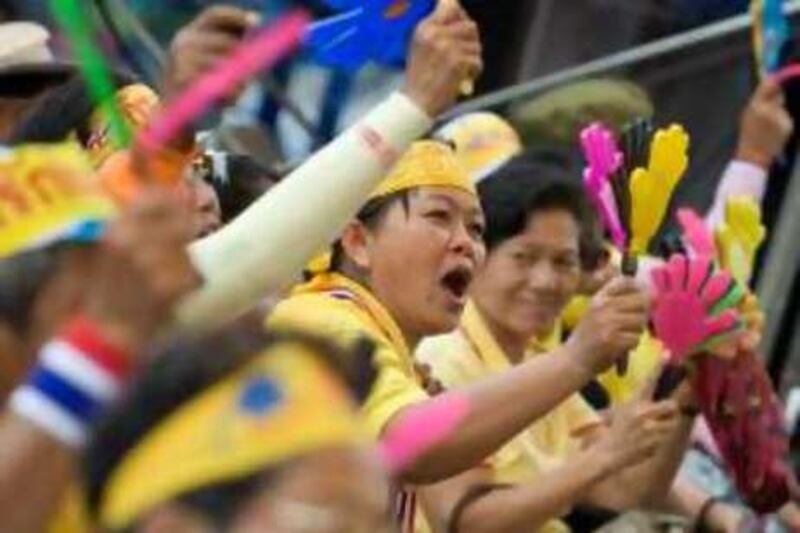BANGKOK // Tension remains high in Thailand over the current political crisis as parliament is scheduled tomorrow to elect a new prime minister, after the Constitutional Court removed Samak Sundaravej from office on Tuesday for presenting a cooking show on television. Politicians from the ruling People's Power Party (PPP) and its five smaller coalition partners have nominated Mr Samak for re-election. "Samak is confident that parliament will find him fit for office, and he is happy to accept the post," Suthin Klangsang, a spokesman for the governing PPP, told journalists today. But pressure is building for the former prime minister to bow out gracefully in light of the court's decision and other cases pending against him, including a defamation suit and a Constitutional Court hearing that could ban him from politics for five years and disband the PPP for electoral fraud. Several government MPs from the north-east of the country are urging Mr Samak not to stand again, according to party sources, and some of the PPP's coalition partners are wary about continuing to back Mr Samak. Analysts said the re-election of Mr Samak would lead to even greater social turmoil than the current situation, that had seen weeks of anti-government protesters demanding the resignation of Mr Samak. "If Samak decides to return, the political conflict will worsen further, and society will see an even more serious rift," said Jantana Suttijaree, a political scientist at Chiang Mai University.
Duncan McCargo, a Thailand analyst at Leeds University in England, agreed. "Samak's return will only lead to more demonstrations, and a widening of the rift between the two camps," he said. Business interests are concerned about the damage being done to Thailand's economy and have urged Mr Samak to heed public opinion and not seek re-election. "We want to see the political deadlock end as soon as possible," Santi Vilassakdanont, chairman of the Federation of Thai Industries, said. "We don't want Samak to return as this will only prolong the impasse." Outside parliament, thousands of protesters - barricaded inside the prime minister's official compound in Bangkok - are now demanding the government resign as well. "If the PPP votes Samak back as prime minister, after he was disqualified by the court, the party's true character will be revealed - they are nothing but bandits," said Somsak Kosaisuk, one of the protests leaders of the People's Alliance for Democracy (Pad).
However, with the country almost evenly divided between support for, and opposition to, the government, many say Mr Samak's resignation will do little to resolve the current deadlock. "The prime minister's resignation will not solve anything, but it will only increase the chances of another coup," said Chaturon Chaisang, a former deputy prime minister under Thaksin Shinawatra - who was ousted two years ago in a military coup and is now living in exile in England. "This is what the protesters want: more turmoil and conflict." Anupong Paochina, the army chief, however, has said the military would not get involved in politics. Today, Mr Paochina urged the government to lift the state of emergency that was introduced 10 days ago, after violent scuffles between pro-government supporters and anti-government protesters left one person dead and several injured.
He has also reportedly suggested that Thailand needs a national coalition government - which would mean Abhsit Vejjajiva, the opposition leader, would become prime minister. The government is keen to portray this political deadlock as a fight between the democratically elected and legitimate government and the illegal and violent mob on the street. "Samak's government is far from perfect. Nevertheless, it was elected [in last December's polls]," said Sombat Thamronthanyawong, of the pro-government National Institute of Development Administration. "The parliamentary process may not be a perfect system, but it provides the best hope for stable and peaceful political development in Thailand. "The People's Alliance for Democracy doesn't just want to change the government, they want to overrule the electoral system itself," Mr Sombat said. The Pad leaders, especially Sondhi Limthongkul, a media mogul, are advocating a "new politics" - a form of paternalism, where the majority of parliament would be nominated rather than elected. "The 70 per cent to 30 per cent is only a model, it could be 50-50," Mr Sondhi said earlier this week.
"I don't know the exact details of the 'new politics'. What is important is that old politics didn't give channels for people to air their grievances; what we have to do is find new ways to get more people to participate in politics from all walks of life," he said. The occupation of government house is not likely to end soon as even a change of prime minister will not placate protesters. "This is a mission - a philosophical fight - and we are prepared to die for the cause," Mr Sondhi said. ljagan@thenational.ae





